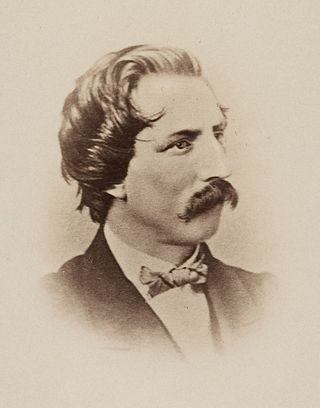
Charles Farrar Browne was an American humor writer, better known under his nom de plume, Artemus Ward, which as a character, an illiterate rube with "Yankee common sense", Browne also played in public performances. He is considered to be America's first stand-up comedian. His birth name was Brown but he added the "e" after he became famous.
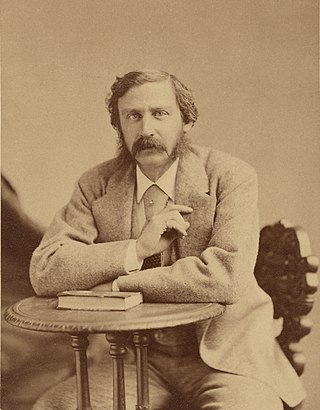
Bret Harte was an American short story writer and poet best remembered for short fiction featuring miners, gamblers, and other romantic figures of the California Gold Rush. In a career spanning more than four decades, he also wrote poetry, plays, lectures, book reviews, editorials, and magazine sketches.
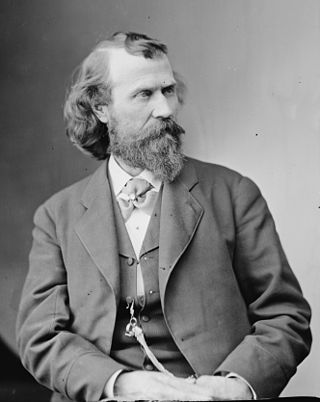
Cincinnatus Heine Miller, better known by his pen name Joaquin Miller, was an American poet, author, and frontiersman. He became known as the "Poet of the Sierras" after the Sierra Nevada, about which he wrote in his Songs of the Sierras (1871).

Thomas Starr King, often known as Starr King, was an American Universalist and Unitarian minister, influential in California politics during the American Civil War, and Freemason. Starr King spoke zealously in favor of the Union and was credited by Abraham Lincoln with preventing California from becoming a separate republic. He is sometimes referred to as "the orator who saved the nation".
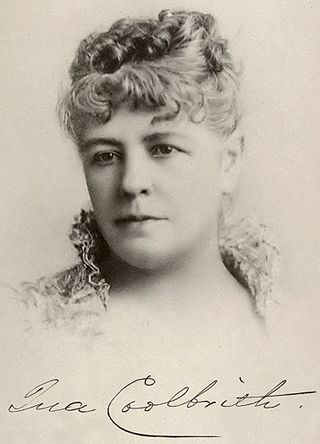
Ina Donna Coolbrith was an American poet, writer, librarian, and a prominent figure in the San Francisco Bay Area literary community. Called the "Sweet Singer of California", she was the first California Poet Laureate and the first poet laureate of any American state.

Bohemianism is a social and cultural movement that has, at its core, a way of life away from society's conventional norms and expectations. The term originates from the French bohème and spread to the English-speaking world. It was used to describe mid-19th-century non-traditional lifestyles, especially of artists, writers, journalists, musicians, and actors in major European cities.

The Bohemian Club is a private club with two locations: a city clubhouse in the Nob Hill district of San Francisco, California, and the Bohemian Grove, a retreat north of the city in Sonoma County. Founded in 1872 from a regular meeting of journalists, artists, and musicians, it soon began to accept businessmen and entrepreneurs as permanent members, as well as offering temporary membership to university presidents and military commanders who were serving in the San Francisco Bay Area. Today, the club has a membership of many local and global leaders, ranging from artists and musicians to businessmen. Membership is restricted to men only.

"The Celebrated Jumping Frog of Calaveras County" is an 1865 short story by Mark Twain. It was his first great success as a writer and brought him national attention. The story has also been published as "Jim Smiley and His Jumping Frog" and "The Notorious Jumping Frog of Calaveras County". In it, the narrator retells a story he heard from a bartender, Simon Wheeler, at the Angels Hotel in Angels Camp, California, about the gambler Jim Smiley. The narrator describes him: "If he even seen a straddle bug start to go anywheres, he would bet you how long it would take him to get to wherever he going to, and if you took him up, he would foller that straddle bug to Mexico but what he would find out where he was bound for and how long he was on the road."
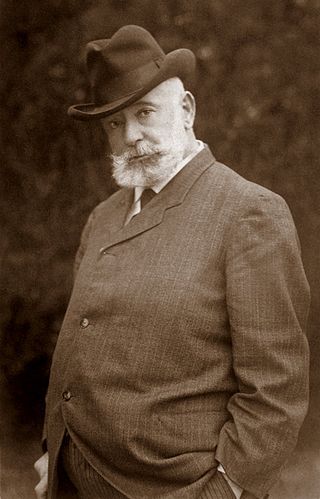
Charles Warren Stoddard was an American author and editor best known for his travel books about Polynesian life.
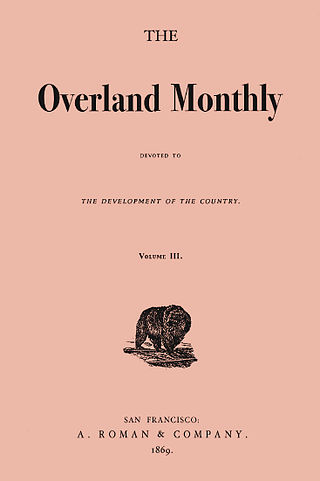
The Overland Monthly was a monthly literary and cultural magazine, based in California, United States. It was founded in 1868 and published between the second half of the 19th century and the first half of the 20th century.

"The Heathen Chinee", originally published as "Plain Language from Truthful James", is a narrative poem by American writer Bret Harte. It was published for the first time in September 1870 in the Overland Monthly. It was written as a parody of Algernon Charles Swinburne's Atalanta in Calydon (1865), and satirized anti-Chinese sentiment in northern California.

"The Luck of Roaring Camp" is a short story by American author Bret Harte. It was first published in the August 1868 issue of the Overland Monthly and helped push Harte to international prominence.

The Wiyot massacre refers to the atrocities on February 26, 1860, at Tuluwat, near Eureka in Humboldt County, California. In coordinated attacks beginning at about 6 am, white settlers murdered 80 to 250 Wiyot people, mostly women and children, with axes, knives, and guns. The attack formed part of the broader California Genocide of Native Americans; similar bloody attacks on other Wiyot villages took place on the same day and later in the week.

Charles Henry Webb was an American poet, author and journalist. He was particularly known for his parodies and humorous writings.

James F. Bowman was a journalist and poet in Northern California, and a co-founder of the Bohemian Club. Bowman served on several newspapers in Placerville, Sacramento and San Francisco during a 24-year career. Through his contacts among San Francisco journalists, Bowman befriended Mark Twain, artist William Keith, critic Ambrose Bierce and a great many others.
The Californian was a San Francisco literary newspaper published weekly from May 28, 1864 until February 1, 1868.
From 1862 to 1865, Samuel Clemens wrote for Virginia City, Nevada's leading newspaper, Territorial Enterprise. There, his literary skills were first realized and he first used the pen name "Mark Twain".

The Montgomery Block, also known as Monkey Block and Halleck's Folly, was a historic building active from 1853 to 1959, and was located in San Francisco, California. It was San Francisco's first fireproof and earthquake resistant building. It came to be known as a Bohemian center, from the late 19th to the middle of the 20th-century.
William Chauncey Bartlett (1818–1907) was an American writer, born December 30, 1818, in Haddam, Connecticut. He attended Williams College, and Ohio University in 1847. He was admitted to Ohio bar, and was a law partner of Hiram Strong in Dayton, Ohio from 1848 to 1855. In 1855 he joined the staff of the Dayton Gazette. In 1857 he preached against slavery in Indianapolis, Indiana.

Madge Morris Wagner was an American poet and journalist associated with The Golden Era. She was a contemporary and friend of Clara Shortridge Foltz and Frona Eunice Wait. Some of Wagner's poems were known around the world.


















